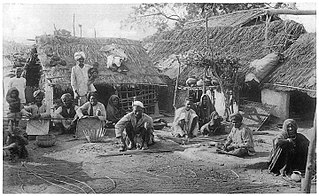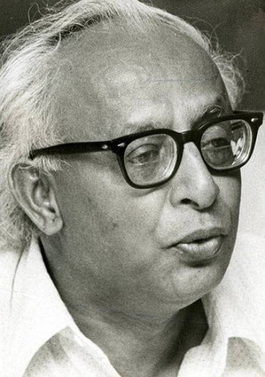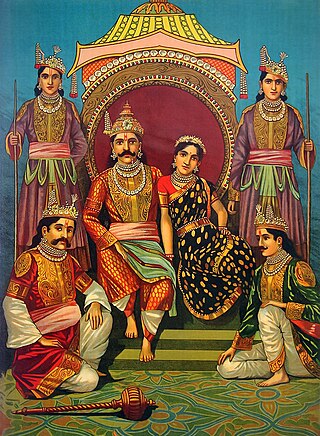Related Research Articles

A caste is a fixed social group into which an individual is born within a particular system of social stratification: a caste system. Within such a system, individuals are expected to marry exclusively within the same caste (endogamy), follow lifestyles often linked to a particular occupation, hold a ritual status observed within a hierarchy, and interact with others based on cultural notions of exclusion, with certain castes considered as either more pure or more polluted than others. The term "caste" is also applied to morphological groupings in eusocial insects such as ants, bees, and termites.
Political anthropology is the comparative study of politics in a broad range of historical, social, and cultural settings.
Arthur Maurice Hocart was an anthropologist best known for his eccentric and often far-seeing works on Polynesia, Melanesia, and Sri Lanka.

Mysore Narasimhachar Srinivas was an Indian sociologist and social anthropologist. He is mostly known for his work on caste and caste systems, social stratification, Sanskritisation and Westernisation in southern India and the concept of 'dominant caste'. He is considered to be one of the pioneering personalities in the field of sociology and social anthropology in India as his work in Rampura remains one of the early examples of ethnography in India. That was in contrast to most of his contemporaries of the Bombay School, who focused primarily on a historical methodology to conduct research, mainly in Indology. He also founded the Department of Sociology at the Delhi School of Economics, University of Delhi in 1959.
History of anthropology in this article refers primarily to the 18th- and 19th-century precursors of modern anthropology. The term anthropology itself, innovated as a Neo-Latin scientific word during the Renaissance, has always meant "the study of man". The topics to be included and the terminology have varied historically. At present they are more elaborate than they were during the development of anthropology. For a presentation of modern social and cultural anthropology as they have developed in Britain, France, and North America since approximately 1900, see the relevant sections under Anthropology.
Sanskritisation is a term in sociology which refers to the process by which castes or tribes placed lower in the caste hierarchy seek upward mobility by emulating the rituals and practices of the dominant castes or upper castes. It is a process similar to "passing" in sociological terms. This term was made popular by Indian sociologist M. N. Srinivas in the 1950s. Sanskritisation has in particular been observed among mid-ranked members of caste-based social hierarchies.

The Digital Himalaya project was established in December 2000 by Mark Turin, Alan Macfarlane, Sara Shneiderman, and Sarah Harrison. The project's principal goal is to collect and preserve historical multimedia materials relating to the Himalaya, such as photographs, recordings, and journals, and make those resources available over the internet and offline, on external storage media. The project team have digitized older ethnographic collections and data sets that were deteriorating in their analogue formats, so as to protect them from deterioration and make them available and accessible to originating communities in the Himalayan region and a global community of scholars.

Field research, field studies, or fieldwork is the collection of raw data outside a laboratory, library, or workplace setting. The approaches and methods used in field research vary across disciplines. For example, biologists who conduct field research may simply observe animals interacting with their environments, whereas social scientists conducting field research may interview or observe people in their natural environments to learn their languages, folklore, and social structures.
Nur Yalman is a leading Turkish social anthropologist at Harvard University, where he serves as senior Research Professor of Social Anthropology and Middle Eastern Studies.
Murray John Leaf is an American social and cultural anthropologist.
Jaunsar-Bawar is a hilly region in Garhwal division of Uttarakhand, northern India. It is located in the north-west of Dehradun district, along the border with the state of Himachal Pradesh.
Muslim communities has a system of social stratification arising from concepts other than "pure" and "impure", which are integral to the caste system in India. It developed as a result of relations among foreign conquerors, local upper-caste Hindus convert to Islam and local lower-caste converts (ajlaf), as well as the continuation of the Indian caste system by converts. Non-ashrafs are backward-caste converts. The concept of "pasmanda" includes ajlaf and arzal Muslims; ajlaf status is defined by descent from converts to Islam and by pesha (profession). These terms are not part of the sociological vocabulary in regions such as Kashmir and Uttar Pradesh, and say little about the functioning of Muslim society.

Surajit Chandra Sinha was an Indian anthropologist.

Polyandry in India refers to the practice of polyandry, whereby a woman has two or more husbands at the same time, either historically on the Indian subcontinent or currently in the country of India. An early example can be found in the Hindu epic Mahabharata, in which Draupadi, daughter of the king of Panchala, is married to five brothers.
Social anthropology is the study of patterns of behaviour in human societies and cultures. It is the dominant constituent of anthropology throughout the United Kingdom and much of Europe, where it is distinguished from cultural anthropology. In the United States, social anthropology is commonly subsumed within cultural anthropology or sociocultural anthropology.

R. S. Khare is a socio-cultural anthropologist and a Professor of Anthropology at the University of Virginia, U.S. He is known for studying “from within/without” India's changing society, religions, food systems, and political cultures, and for following the trajectories of contemporary Indian traditional and modern cultural discourses. His anthropology has endeavored to widen reasoned bridges across the India-West cultural, religious-philosophical, and literary distinctions and differences.
Mikhail Konstantinovich Kudryavtsev was a Soviet ethnographer and Indologist.

Stephen Fuchs was an Austrian Catholic priest, missionary, and anthropologist who researched the ethnology and prehistory of India. After obtaining a Ph.D. in ethnology and Indology from the University of Vienna in 1950, Fuchs moved to India where he assisted in founding the Department of Anthropology at St. Xavier's College in Bombay. After a brief imprisonment for being misidentified as a German missionary by the British government during World War II, Fuchs founded the Indian Branch of the Anthropos Institute, later renamed the Institute of Indian Culture. Fuchs, because of health concerns, moved to Austria in 1996 and died at the age of 91 in Mödling, Austria.
Harald Tambs-Lyche is a Norwegian ethnologist and social anthropologist.
Tribal casteism encompasses South Asian practices of social marginalisation within tribes. These practices are often overlooked by scholars and the media because of a colonial legacy that employed orientalist empiricism to construct tribes as egalitarian and structurally opposite to Hindu caste society. Indian sociologists and historians often appeal to a "tribe-to-caste continuum" that has elements of contested social evolution and miss the fluid and changing nature of tribal social organization, both internally and with regard to state recognition for affirmative action quotas—Scheduled Castes and Scheduled Tribes.
References
- 1 2 "Gerald Berreman". Archived from the original on 2015-04-16. Retrieved 2015-08-26.
- ↑ "Social anthropologist Gerald Berreman dies at age 83". 30 November 2001.
- ↑ Berreman, Gerald D (1962). "Behind Many Masks: Ethnography and Impression Management in a Himalayan Village".
{{cite journal}}: Cite journal requires|journal=(help)